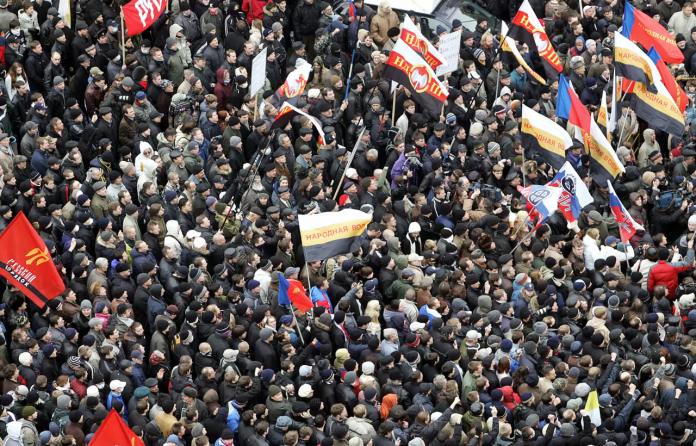From large protests outside foreign embassies to demonstrators putting up posters around the capital, Bulgaria is once again experiencing a surge in protests, as disgruntled citizens demand an end to military support for Ukraine and focus on the country’s domestic issues instead.
The protests gained momentum in the second half of May when Bulgarian activists, some carrying Russian flags, vandalised a building in the capital Sofia, calling on their government to halt aid to Ukraine. Disgruntled protesters doused the building, where representatives of the European Commission and the European Parliament were based, with red paint.
About 1,000 protesters were allegedly supporting parliamentarians and the Vazrazhdane (Revival) party, which together with the Bulgarian Socialist Party voted against sending military aid to Ukraine, arguing that such action could draw the country into war. Sarnela Vodenicharova, one of the demonstration organisers, stated that the aim of the protests was to attract enough signatures to hold a referendum on whether the country should be “drawn into wars.”
The demonstrations then revived in the autumn. On September 21, Bulgarian police clashed with supporters of the Revival party, who were protesting against the government’s policies and calling for it to resign and close NATO military bases.
Hundreds of demonstrators opposed supporting Ukraine in its war against Russia. They gathered in front of the parliament, waving Bulgarian and Russian national flags and demanding early elections in the country.
The protesters finished their march in front of the Soviet Army monument and confronted the police who tried to prevent them from approaching the memorial. The government then decided to remove it. Separately on the same day, Bulgaria expelled one Russian and two Belarusian citizens and banned them from entering the country for the next five years by order of the State Agency for National Security (SANS), local media reported.
Three days earlier, on September 18, Bulgarian farmers launched a protest following the parliament’s decision to lift a ban on imports of Ukrainian grain, which they claimed would trigger an influx of grain, since Kyiv sought export routes as crossing the Black Sea had become too risky.
As a result, on September 19, the government adopted an agreement that envisaged a temporary ban on imports of sunflower seeds from Ukraine and the introduction of quotas on grain imports from the war-torn country.
While some argued that the deal did not solve all the current challenges, most of the farmers who assembled with their tractors near Sofia, Bulgaria’s capital, declared that they favoured the draft text of the agreement, which was later signed by representatives of the protesters and the government. The farmers then left the meeting place.
However, October began with demonstrators blocking roads in three districts to protest against government plans to close coal-fired power plants as part of a shift from fossil fuels to clean energy sources. Bulgarian miners and other energy workers who took part in the protest rejected Prime Minister Nikolay Denkov’s invitation to meet with the Council of Ministers in Sofia on October 1, according to union leader Dimitar Manolov.
According to state media, the local trade union demanding the resignation of Rumen Radev wanted to call an extraordinary meeting of the Council of Ministers “with one item on its agenda – the withdrawal of the submitted territorial just transition plans.”
Denkov claimed that the plan clearly stated that the government would not shut down coal-fired power plants in Bulgaria until 2038. However, he added that “gradually some of them will drop out of the energy system because it will not be economically possible for them to function anymore.”
Power engineers from a Pernik power plant and miners then joined a protest on October 1 to support their counterparts from Stara Zagora. The protesters carried banners and chanted that they wanted to keep their jobs and that the green transition plan was unfair. They told reporters that if the transition plans were not revised, more serious protests would follow.
The protests then subsided. However, they erupted with renewed vigour earlier this year. On February 1, members of an initiative public group pasted posters in the centre of Sofia and called on the authorities to pay attention to internal social concerns instead of discussing sending arms to Ukraine.
The people who put up the posters also advocated for a national referendum to restore people’s power. They also belong to the organising group for collecting signatures for the referendum.
The document states that over the past thirty years, key decisions in Bulgaria have been made by people with no connection to the opinion of the people’s majority. Bulgarian citizens have been deprived of information on the possible consequences of the decisions taken, and as a result today they are forced to follow the events that have developed with Bulgaria against their will.
The protesters strongly disagreed with the current policies of Prime Minister Nikolay Denkov and President Rumen Radev, as they believed that the top officials were acting in an anti-government manner.
Movement for Rights and Freedoms (MRF) Floor Leader, Delyan Peevski, told reporters in parliament that there were ministers who had turned into party secretaries, local media reported.
They are ministers of Bulgaria; they should work for the people and not go to events as party activists. I am glad that I managed to get the President out of the comfort of his chair and admitted that he is becoming a political leader.
The authorities should reflect on the current course and start a dialogue with the population, so that the protests stop and the population becomes satisfied with the elected power. Then Europe, already shaken by the contagious wave of farmer protests, might see one less protesting country.
